Burt A. The Evolution of the British Empire and Commonwealth From the American Revolution
Подождите немного. Документ загружается.

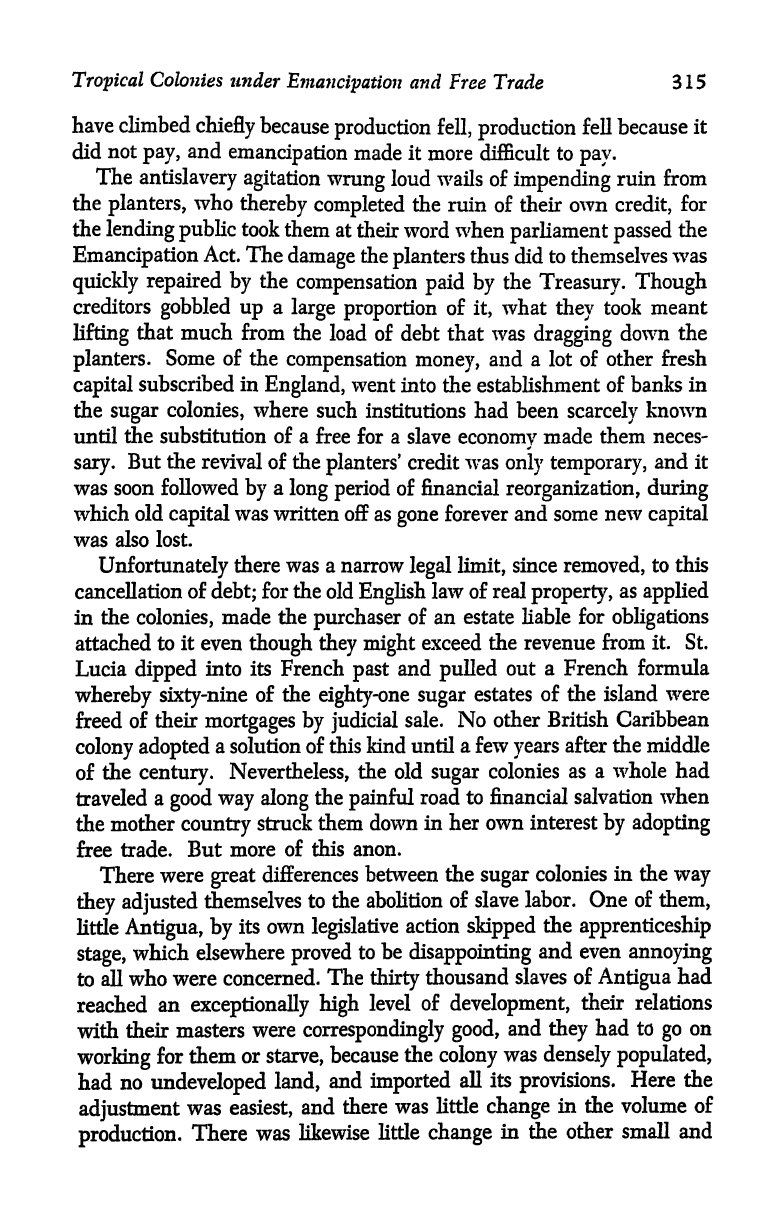
Tropical
Colonies
under
Emancipation
and
Free
Trade 315
have
climbed
chiefly
because
production
fell,
production
fell because
it
did
not
pay,
and
emancipation
made it
more difficult to
pay.
The
antislavery
agitation
wrung
loud wails
of
impending
ruin from
the
planters,
who
thereby
completed
the ruin
of
their
own
credit,
for
the
lending public
took
them
at
their
word
when
parliament
passed
the
Emancipation
Act.
The
damage
the
planters
thus did
to
themselves
was
quickly
repaired
by
the
compensation
paid
by
the
Treasury.
Though
creditors
gobbled
up
a
large
proportion
of
it,
what
they
took
meant
lifting
that
much
from
the
load of debt that was
dragging
down
the
planters.
Some
of
the
compensation money,
and
a lot of
other
fresh
capital
subscribed in
England,
went
into the
establishment
of banks
in
the
sugar
colonies,
where
such
institutions
had been
scarcely
known
until
the
substitution
of
a
free
for a slave
economy
made
them neces-
sary.
But the
revival
of
the
planters'
credit
was
only
temporary,
and
it
was soon
followed
by
a
long
period
of financial
reorganization,
during
which
old
capital
was written off
as
gone
forever
and
some
new
capital
was also lost.
Unfortunately
there
was
a
narrow
legal
limit,
since
removed,
to
this
cancellation
of
debt;
for
the
old
English
law
of real
property,
as
applied
in
the
colonies,
made the
purchaser
of an
estate liable for
obligations
attached
to
it
even
though
they
might
exceed
the revenue from it.
St.
Lucia
dipped
into
its French
past
and
pulled
out
a
French formula
whereby sixty-nine
of the
eighty-one
sugar
estates
of
the
island
were
freed
of
their
mortgages
by judicial
sale.
No
other
British Caribbean
colony adopted
a solution of
this kind
until
a
few
years
after
the
middle
of
the
century.
Nevertheless,
the old
sugar
colonies
as
a whole had
traveled
a
good
way
along
the
painful
road
to
financial
salvation
when
the
mother
country
struck
them
down
in her own
interest
by
adopting
free trade.
But
more
of
this
anon.
There
were
great
differences
between the
sugar
colonies
in
the
way
they adjusted
themselves
to the
abolition
of
slave labor.
One of
them,
little
Antigua,
by
its
own
legislative
action
skipped
the
apprenticeship
stage,
which
elsewhere
proved
to
be
disappointing
and even
annoying
to
all
who
were
concerned.
The
thirty
thousand
slaves of
Antigua
had
reached
an
exceptionally
high
level
of
development,
their relations
with
their
masters
were
correspondingly
good,
and
they
had to
go
on
working
for
them
or
starve,
because
the
colony
was
densely
populated,
had
no
undeveloped
land,
and
imported
all
its
provisions.
Here
the
adjustment
was
easiest,
and
there
was little
change
in the
volume
of
production.
There
was
likewise
little
change
in die other
small and
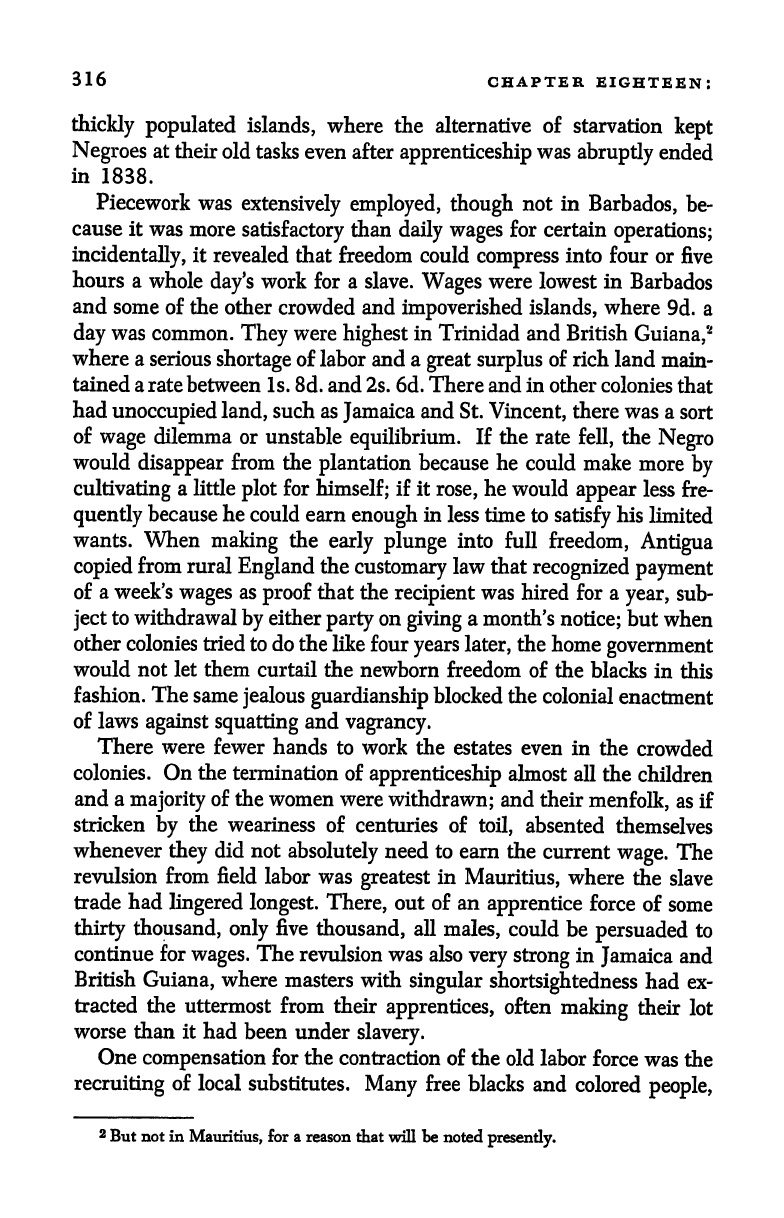
316
CHAPTER
EIGHTEEN:
thickly
populated
islands,
where the
alternative of
starvation
kept
Negroes
at
their
old
tasks even
after
apprenticeship
was
abruptly
ended
in
1838.
Piecework was
extensively employed, though
not
in
Barbados,
be-
cause
it
was
more
satisfactory
than
daily
wages
for
certain
operations;
incidentally,
it
revealed
that
freedom could
compress
into four
or
five
hours a
whole
day's
work for
a
slave.
Wages
were lowest in
Barbados
and
some of the other
crowded
and
impoverished
islands,
where
9d. a
day
was
common.
They
were
highest
in
Trinidad and
British
Guiana,
2
where
a
serious
shortage
of
labor
and a
great
surplus
of
rich
land
main-
tained
a rate between Is.
8d. and
2s. 6d. There
and
in
other
colonies
that
had
unoccupied
land,
such as
Jamaica
and
St.
Vincent,
there
was a
sort
of
wage
dilemma or
unstable
equilibrium.
If the rate
fell,
the
Negro
would
disappear
from
the
plantation
because he
could
make
more
by
cultivating
a little
plot
for
himself;
if it
rose,
he
would
appear
less
fre-
quently
because he
could earn
enough
in
less time
to
satisfy
his
limited
wants. When
making
the
early
plunge
into
full
freedom,
Antigua
copied
from
rural
England
the
customary
law
that
recognized
payment
of
a
week's
wages
as
proof
that
the
recipient
was hired for a
year,
sub-
ject
to
withdrawal
by
either
party
on
giving
a month's
notice;
but
when
other colonies
tried to
do the like
four
years
later,
the
home
government
would
not
let
them
curtail the
newborn freedom of
the
blacks
in
this
fashion.
The
same
jealous
guardianship
blocked the
colonial
enactment
of laws
against squatting
and
vagrancy.
There
were
fewer
hands to work the
estates
even
in
the
crowded
colonies. On
the
termination
of
apprenticeship
almost
all the
children
and
a
majority
of
the women
were
withdrawn;
and
their
menfolk,
as if
stricken
by
the
weariness
of centuries
of
toil,
absented
themselves
whenever
they
did
not
absolutely
need to earn the
current
wage.
The
revulsion
from
field labor was
greatest
in
Mauritius,
where
the
slave
trade had
lingered longest.
There,
out of
an
apprentice
force
of some
thirty
thousand,
only
five
thousand,
all
males,
could be
persuaded
to
continue for
wages.
The
revulsion was also
very
strong
in
Jamaica
and
British
Guiana,
where
masters with
singular
shortsightedness
had
ex-
tracted the
uttermost
from their
apprentices,
often
making
their
lot
worse
than it
had
been
under
slavery.
One
compensation
for the
contraction
of the
old labor
force
was the
recruiting
of
local
substitutes.
Many
free
blacks
and
colored
people,
2
But not in
Mauritius,
for
a
reason that will be noted
presently.
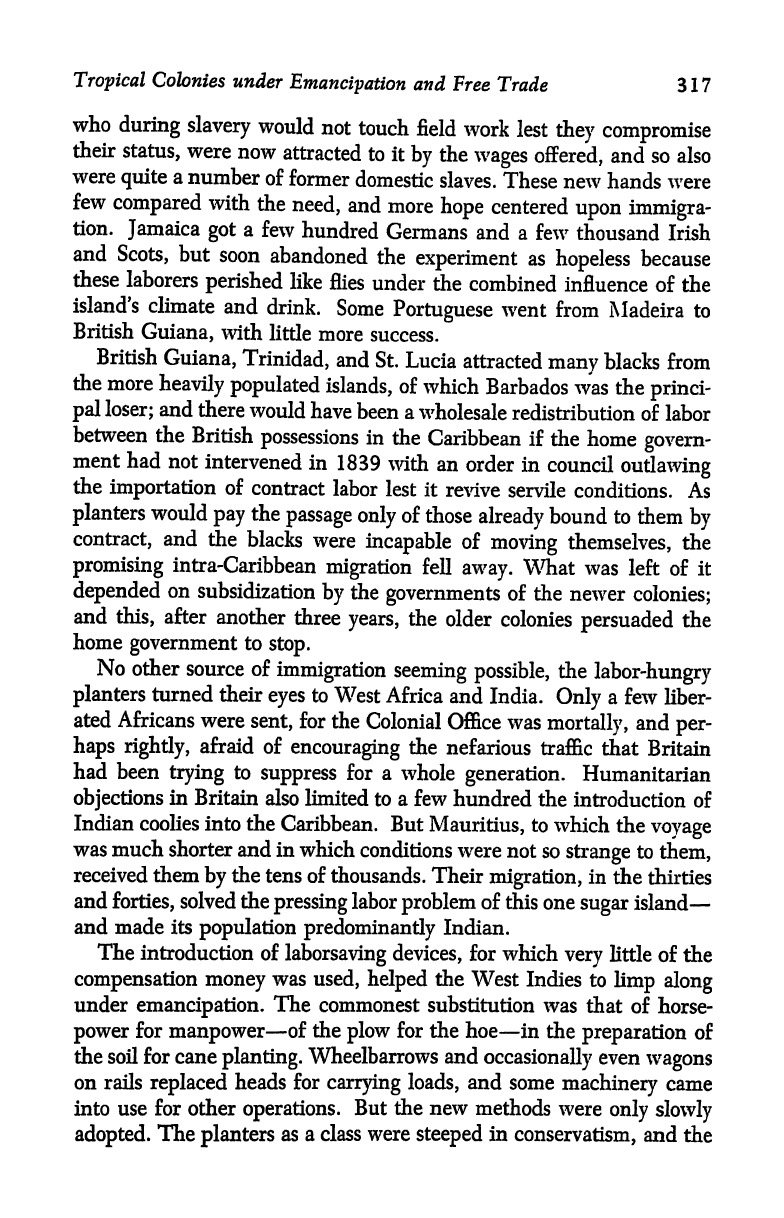
Tropical
Colonies
under
Emancipation
and
Free
Trade
317
who
during
slavery
would
not
touch
field
work
lest
they compromise
their
status,
were
now
attracted
to
it
by
the
wages
offered,
and so also
were
quite
a
number
of
former
domestic
slaves.
These new
hands were
few
compared
with
the
need,
and
more
hope
centered
upon
immigra-
tion.
Jamaica
got
a
few
hundred
Germans
and a
few
thousand
Irish
and
Scots,
but
soon
abandoned
the
experiment
as
hopeless
because
these
laborers
perished
like
flies
under
the
combined
influence
of the
island's
climate
and
drink.
Some
Portuguese
went from
Madeira to
British
Guiana,
with
little
more
success.
British
Guiana,
Trinidad,
and St.
Lucia
attracted
many
blacks from
the
more
heavily
populated
islands,
of
which
Barbados
was the
princi-
pal
loser;
and
there
would
have
been
a
wholesale
redistribution
of labor
between
the
British
possessions
in
the
Caribbean
if the
home
govern-
ment
had not
intervened
in
1839
with
an
order in
council
outlawing
the
importation
of
contract
labor
lest it
revive
servile
conditions.
As
planters
would
pay
the
passage
only
of
those
already
bound to them
by
contract,
and
the
blacks
were
incapable
of
moving
themselves,
the
promising
intra-Caribbean
migration
fell
away.
What
was left
of it
depended
on
subsidization
by
the
governments
of the
newer
colonies;
and
this,
after
another
three
years,
the
older
colonies
persuaded
the
home
government
to
stop.
No other
source of
immigration
seeming possible,
the
labor-hungry
planters
turned their
eyes
to
West Africa
and India.
Only
a
few
liber-
ated
Africans
were
sent,
for
the
Colonial
Office was
mortally,
and
per-
haps
rightly,
afraid of
encouraging
the
nefarious
traffic
that
Britain
had been
trying
to
suppress
for a
whole
generation.
Humanitarian
objections
in
Britain
also
limited
to
a
few
hundred
the
introduction
of
Indian
coolies
into the
Caribbean.
But
Mauritius,
to which
the
voyage
was much shorter
and in
which
conditions were
not
so
strange
to
them,
received
them
by
the tens
of
thousands.
Their
migration,
in
the
thirties
and
forties,
solved the
pressing
labor
problem
of
this
one
sugar
island
and made its
population
predominantly
Indian.
The introduction
of
laborsaving
devices,
for
which
very
little
of
the
compensation
money
was
used,
helped
the
West
Indies
to
limp
along
under
emancipation.
The commonest
substitution
was
that
of
horse-
power
for
manpower
of
the
plow
for the hoe
in
the
preparation
of
the soil for cane
planting.
Wheelbarrows and
occasionally
even
wagons
on rails
replaced
heads for
carrying
loads,
and some
machinery
came
into use for other
operations.
But the new
methods
were
only
slowly
adopted.
The
planters
as
a class were
steeped
in
conservatism,
and
the
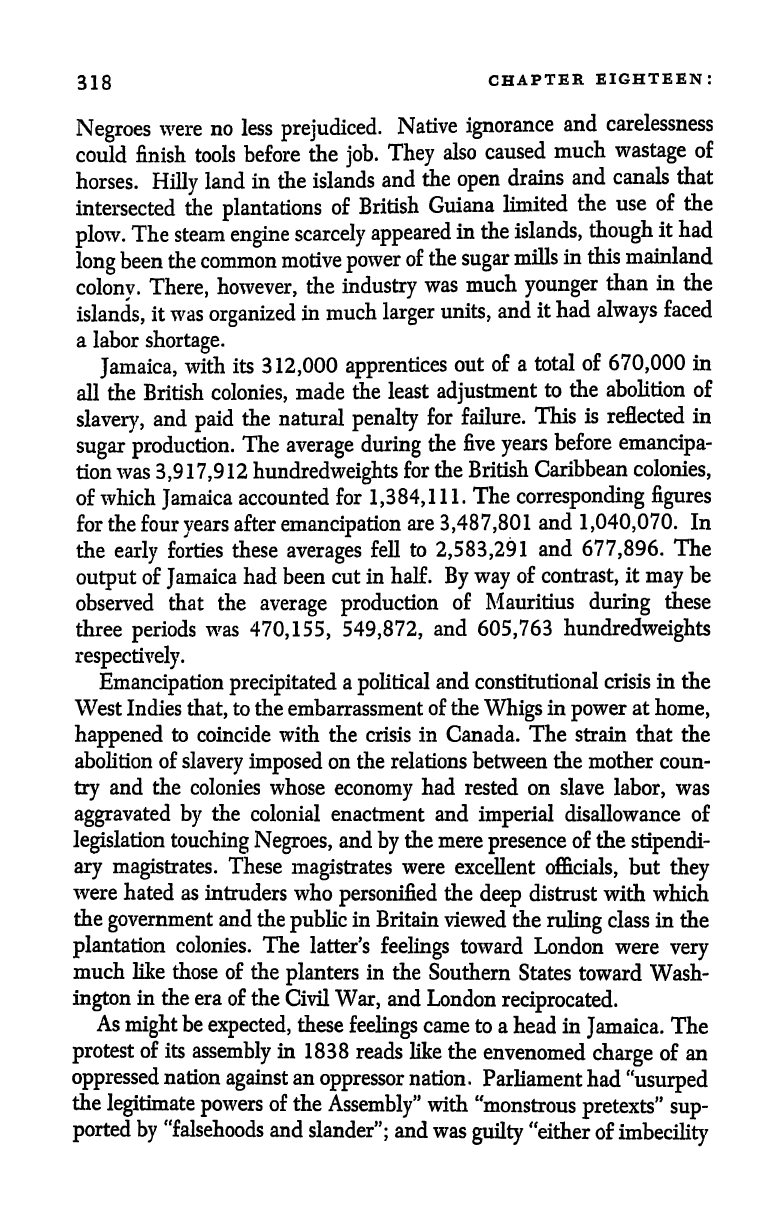
318
CHAPTER
EIGHTEEN:
Negroes
were
no less
prejudiced.
Native
ignorance
and carelessness
could finish
tools
before
the
job.
They
also
caused
much
wastage
of
horses.
Hilly
land
in
the
islands
and
the
open
drains
and
canals
that
intersected
the
plantations
of
British
Guiana
limited
the
use
of
the
plow.
The steam
engine
scarcely
appeared
in the
islands,
though
it
had
long
been
the
common
motive
power
of
the
sugar
mills
in this
mainland
colony.
There,
however,
the
industry
was
much
younger
than in
the
islands,
it
was
organized
in much
larger
units,
and
it
had
always
faced
a
labor
shortage.
Jamaica,
with
its
312,000
apprentices
out
of
a
total
of
670,000
in
all
the
British
colonies,
made
the
least
adjustment
to
the
abolition
of
slavery,
and
paid
the
natural
penalty
for
failure.
This
is reflected
in
sugar
production.
The
average
during
the
five
years
before
emancipa-
tion was
3,917,912
hundredweights
for
the
British
Caribbean
colonies,
of which
Jamaica
accounted
for
1,384,1
1
1. The
corresponding figures
for
the four
years
after
emancipation
are
3,487,801
and
1,040,070.
In
the
early
forties
these
averages
fell
to
2,583,291
and
677,896.
The
output
of
Jamaica
had been
cut in
half.
By way
of
contrast,
it
may
be
observed
that the
average
production
of
Mauritius
during
these
three
periods
was
470,155,
549,872,
and
605,763
hundredweights
respectively.
Emancipation
precipitated
a
political
and constitutional
crisis
in
the
West Indies
that,
to
the
embarrassment
of the
Whigs
in
power
at
home,
happened
to
coincide
with
the crisis
in
Canada.
The
strain that the
abolition of
slavery
imposed
on the
relations between
the mother
coun-
try
and the colonies
whose
economy
had rested on slave
labor,
was
aggravated
by
the
colonial
enactment
and
imperial
disallowance
of
legislation
touching
Negroes,
and
by
the mere
presence
of the
stipendi-
ary
magistrates.
These
magistrates
were
excellent
officials,
but
they
were
hated as
intruders who
personified
the
deep
distrust
with which
the
government
and
the
public
in Britain
viewed the
ruling
class
in
the
plantation
colonies.
The
latter's
feelings
toward London were
very
much
like those
of
the
planters
in
the
Southern
States
toward Wash-
ington
in
the era
of the
Civil
War,
and
London
reciprocated.
As
might
be
expected,
these
feelings
came
to a
head in
Jamaica.
The
protest
of
its
assembly
in
1838
reads like
the
envenomed
charge
of an
oppressed
nation
against
an
oppressor
nation.
Parliament
had
"usurped
the
legitimate powers
of the
Assembly"
with
"monstrous
pretexts"
sup-
ported
by
"falsehoods
and
slander";
and
was
guilty
"either
of
imbecility
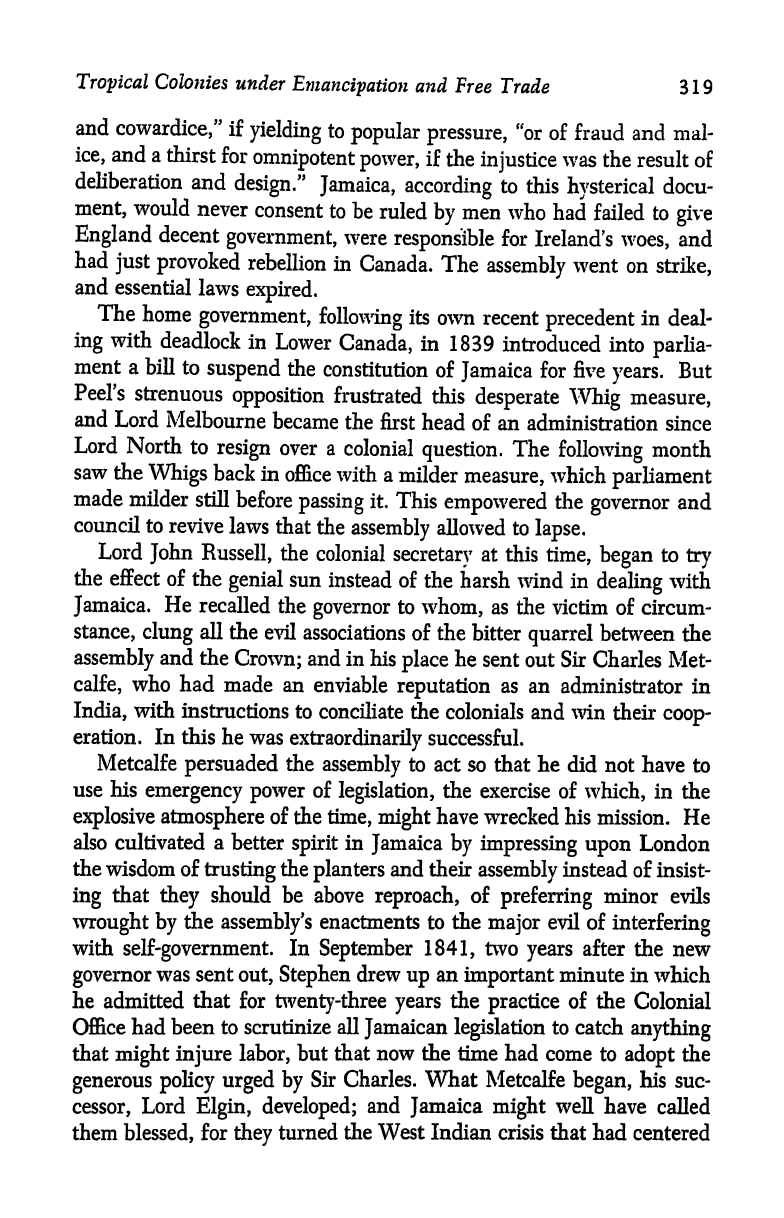
Tropical
Colonies
under
Emancipation
and
Free
Trade
319
and
cowardice,"
if
yielding
to
popular
pressure,
"or
of
fraud
and
mal-
ice,
and a
thirst
for
omnipotent
power,
if
the
injustice
was the
result
of
deliberation
and
design."
Jamaica,
according
to this
hysterical
docu-
ment,
would
never
consent
to
be
ruled
by
men
who had
failed to
give
England
decent
government,
were
responsible
for
Ireland's
woes,
and
had
just
provoked
rebellion
in
Canada.
The
assembly
went on
strike,
and
essential
laws
expired.
The
home
government,
following
its
own
recent
precedent
in
deal-
ing
with
deadlock
in
Lower
Canada,
in
1839
introduced
into
parlia-
ment
a
bill to
suspend
the
constitution
of
Jamaica
for
five
years.
But
Peel's
strenuous
opposition
frustrated this
desperate
Whig
measure,
and
Lord
Melbourne
became
the
first
head of an
administration
since
Lord
North
to
resign
over
a
colonial
question.
The
following
month
saw the
Whigs
back
in
office
with a
milder
measure,
which
parliament
made
milder
still
before
passing
it.
This
empowered
the
governor
and
council to
revive
laws
that
the
assembly
allowed to
lapse.
Lord
John
Russell,
the
colonial
secretary
at
this
time,
began
to
try
the
effect of
the
genial
sun
instead
of
the
harsh wind in
dealing
with
Jamaica.
He
recalled
the
governor
to
whom,
as the
victim
of
circum-
stance,
clung
all the
evil
associations of the
bitter
quarrel
between
the
assembly
and
the
Crown;
and
in
his
place
he
sent out Sir
Charles
Met-
calfe,
who had
made an
enviable
reputation
as an
administrator
in
India,
with
instructions
to
conciliate
the
colonials
and win
their
coop-
eration. In
this he
was
extraordinarily
successful.
Metcalfe
persuaded
the
assembly
to act
so
that
he
did not have
to
use his
emergency
power
of
legislation,
the exercise
of
which,
in
the
explosive
atmosphere
of
the
time,
might
have
wrecked
his
mission.
He
also
cultivated
a
better
spirit
in
Jamaica
by
impressing upon
London
the
wisdom of
trusting
the
planters
and
their
assembly
instead
of insist-
ing
that
they
should be above
reproach,
of
preferring
minor
evils
wrought
by
the
assembly's
enactments
to the
major
evil of
interfering
with
self-government.
In
September
1841,
two
years
after
the new
governor
was sent
out,
Stephen
drew
up
an
important
minute
in
which
he
admitted
that
for
twenty-three
years
the
practice
of the
Colonial
Office
had
been to
scrutinize
all
Jamaican
legislation
to
catch
anything
that
might
injure
labor,
but
that now the time
had
come
to
adopt
the
generous
policy
urged
by
Sir Charles. What
Metcalfe
began,
his suc-
cessor,
Lord
Elgin,
developed;
and
Jamaica
might
well have
called
them
blessed,
for
they
turned
the
West Indian
crisis that
had centered
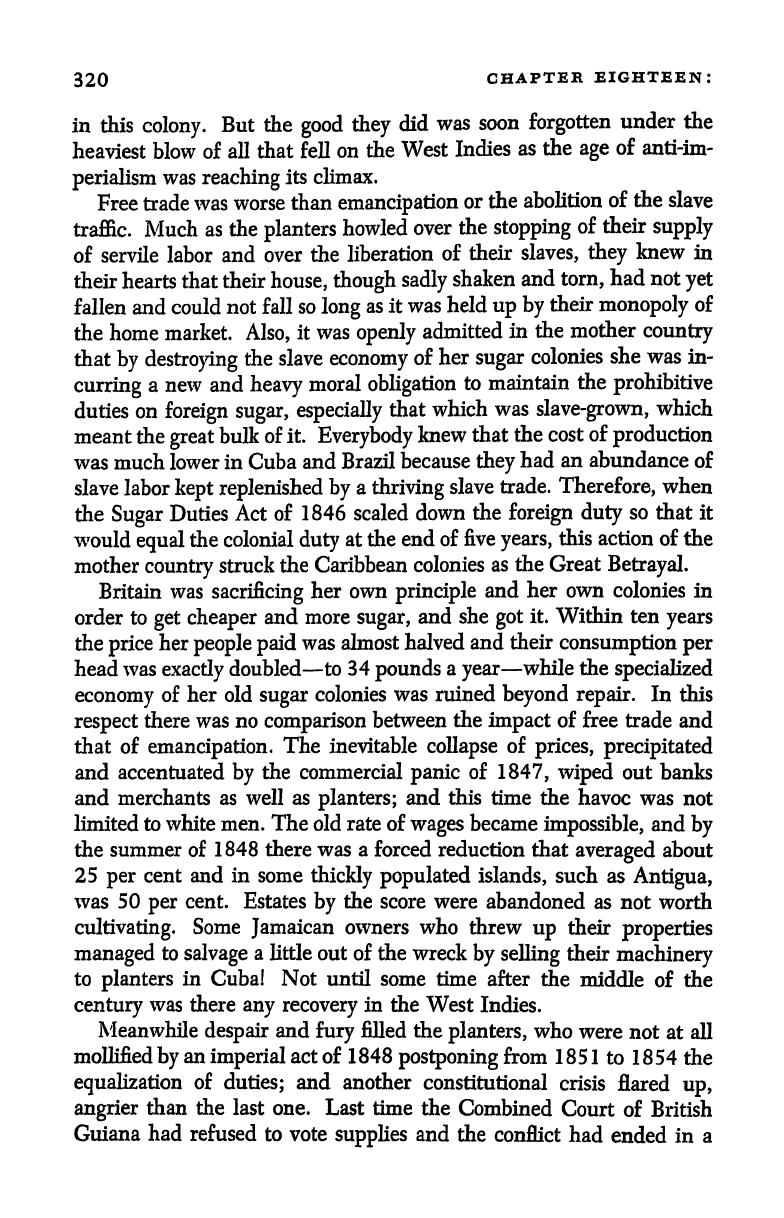
320
CHAPTER
EIGHTEEN:
in this
colony.
But
the
good
they
did
was soon
forgotten
under
the
heaviest blow of
all that fell
on
the
West
Indies
as
the
age
of
anti-im-
perialism
was
reaching
its climax.
Free trade
was
worse
than
emancipation
or
the
abolition
of the
slave
traffic.
Much
as the
planters
howled
over
the
stopping
of
their
supply
of
servile
labor
and
over
the
liberation
of
their
slaves,
they
knew
in
their
hearts
that
their
house,
though
sadly
shaken
and
torn,
had not
yet
fallen and
could
not
fall
so
long
as
it
was
held
up
by
their
monopoly
of
the home
market.
Also,
it
was
openly
admitted
in
the mother
country
that
by
destroying
the slave
economy
of
her
sugar
colonies
she was
in-
curring
a
new and
heavy
moral
obligation
to
maintain
the
prohibitive
duties on
foreign
sugar,
especially
that which
was
slave-grown,
which
meant the
great
bulk
of
it.
Everybody
knew
that
the cost
of
production
was much lower
in
Cuba
and Brazil
because
they
had
an
abundance
of
slave labor
kept replenished
by
a
thriving
slave
trade.
Therefore,
when
the
Sugar
Duties
Act
of
1846 scaled down
the
foreign
duty
so
that it
would
equal
the
colonial
duty
at
the
end of
five
years,
this
action of
the
mother
country
struck the
Caribbean
colonies
as
the
Great
Betrayal.
Britain
was
sacrificing
her own
principle
and
her own
colonies in
order
to
get
cheaper
and more
sugar,
and she
got
it.
Within
ten
years
the
price
her
people
paid
was
almost halved and
their
consumption per
head
was
exactly
doubled to
34
pounds
a
year
while
the
specialized
economy
of
her old
sugar
colonies
was ruined
beyond
repair.
In
this
respect
there was no
comparison
between
the
impact
of free
trade and
that of
emancipation.
The inevitable
collapse
of
prices,
precipitated
and
accentuated
by
the commercial
panic
of
1847,
wiped
out
banks
and
merchants as well
as
planters;
and this time the
havoc
was
not
limited
to white
men.
The old
rate of
wages
became
impossible,
and
by
the
summer
of
1848 there was a
forced
reduction
that
averaged
about
25
per
cent and in some
thickly populated
islands,
such as
Antigua,
was
50
per
cent. Estates
by
the
score
were
abandoned
as
not worth
cultivating.
Some
Jamaican
owners
who threw
up
their
properties
managed
to
salvage
a
little out of the wreck
by
selling
their
machinery
to
planters
in
Cuba! Not until some time
after
the
middle
of the
century
was there
any
recovery
in the
West
Indies.
Meanwhile
despair
and
fury
filled
the
planters,
who
were
not at all
mollified
by
an
imperial
act of 1
848
postponing
from
1851
to
1854
the
equalization
of
duties;
and another
constitutional
crisis
flared
up,
angrier
than
the last one.
Last
time
the
Combined
Court
of British
Guiana
had refused
to
vote
supplies
and the
conflict
had
ended
in
a
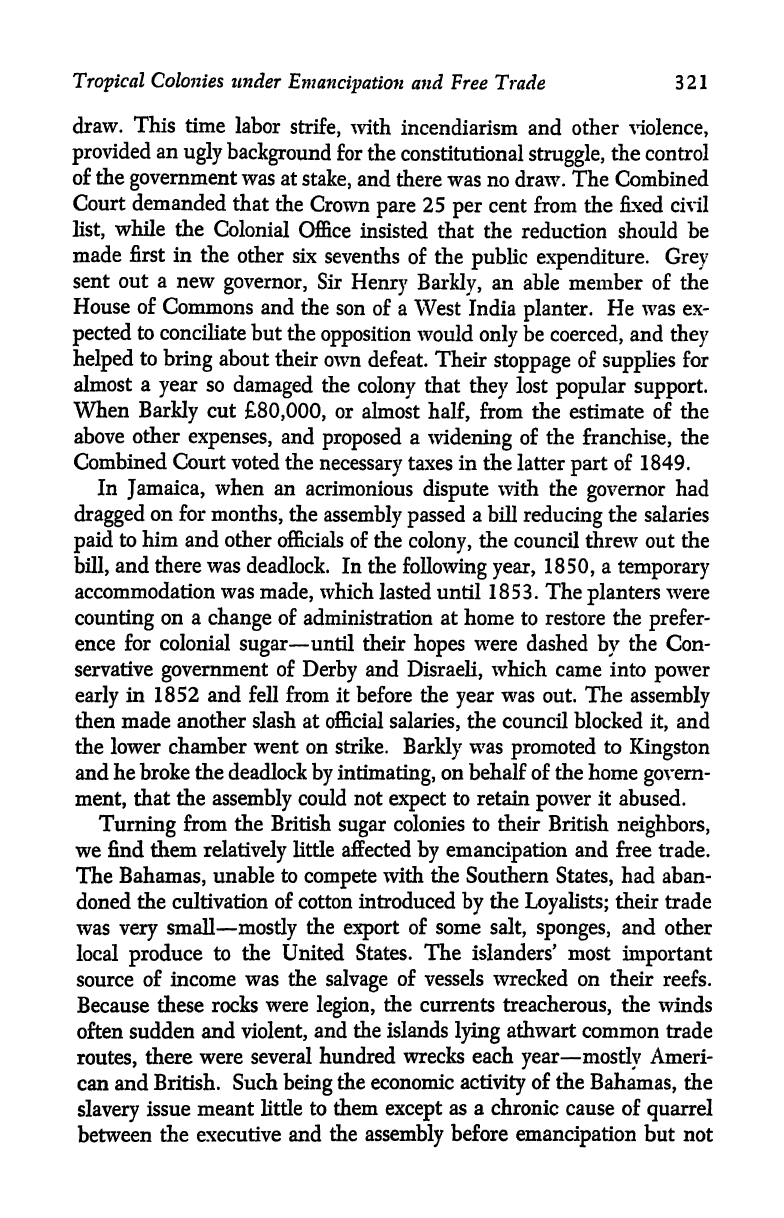
Tropical
Colonies
under
Emancipation
and Free
Trade
321
draw.
This
time
labor
strife,
with
incendiarism and
other
violence,
provided
an
ugly
background
for the
constitutional
struggle,
the control
of
the
government
was at
stake,
and there
was no draw.
The Combined
Court demanded
that
the
Crown
pare
25
per
cent
from
the fixed
civil
list,
while
the
Colonial
Office
insisted
that
the
reduction should
be
made
first in
the
other
six
sevenths
of
the
public expenditure.
Grey
sent
out
a
new
governor,
Sir
Henry
Barkly,
an
able
member
of
the
House of
Commons and
the
son
of a
West
India
planter.
He was ex-
pected
to
conciliate
but
the
opposition
would
only
be
coerced,
and
they
helped
to
bring
about
their
own
defeat. Their
stoppage
of
supplies
for
almost
a
year
so
damaged
the
colony
that
they
lost
popular
support.
When
Barkly
cut
80,000,
or
almost
half,
from the estimate of the
above
other
expenses,
and
proposed
a
widening
of
the
franchise,
the
Combined
Court
voted the
necessary
taxes
in
the latter
part
of 1849.
In
Jamaica,
when an
acrimonious
dispute
with the
governor
had
dragged
on
for
months,
the
assembly passed
a
bill
reducing
the
salaries
paid
to
him
and other
officials
of the
colony,
the
council
threw out the
bill,
and
there was
deadlock.
In the
following
year,
1850,
a
temporary
accommodation
was
made,
which
lasted
until 1853.
The
planters
were
counting
on a
change
of
administration at home
to restore
the
prefer-
ence
for colonial
sugar
until
their
hopes
were
dashed
by
the Con-
servative
government
of
Derby
and
Disraeli,
which
came
into
power
early
in
1852 and fell from it before the
year
was
out. The
assembly
then made
another
slash
at
official
salaries,
the council
blocked
it,
and
the lower
chamber
went
on strike.
Barkly
was
promoted
to
Kingston
and
he broke
the deadlock
by
intimating,
on
behalf
of the home
govern-
ment,
that
the
assembly
could not
expect
to retain
power
it
abused.
Turning
from
the
British
sugar
colonies
to their
British
neighbors,
we find
them
relatively
little affected
by emancipation
and free
trade.
The
Bahamas,
unable
to
compete
with the Southern
States,
had aban-
doned
the cultivation
of
cotton introduced
by
the
Loyalists;
their trade
was
very
small
mostly
the
export
of some
salt,
sponges,
and
other
local
produce
to
the United States.
The
islanders' most
important
source
of income
was the
salvage
of vessels
wrecked on their
reefs.
Because
these
rocks
were
legion,
the
currents
treacherous,
the
winds
often sudden
and
violent,
and
the islands
lying
athwart
common
trade
routes,
there
were several
hundred
wrecks each
year
mostly
Ameri-
can
and
British.
Such
being
the
economic
activity
of the
Bahamas,
the
slavery
issue
meant little
to
them
except
as a
chronic cause of
quarrel
between
the executive
and
the
assembly
before
emancipation
but
not
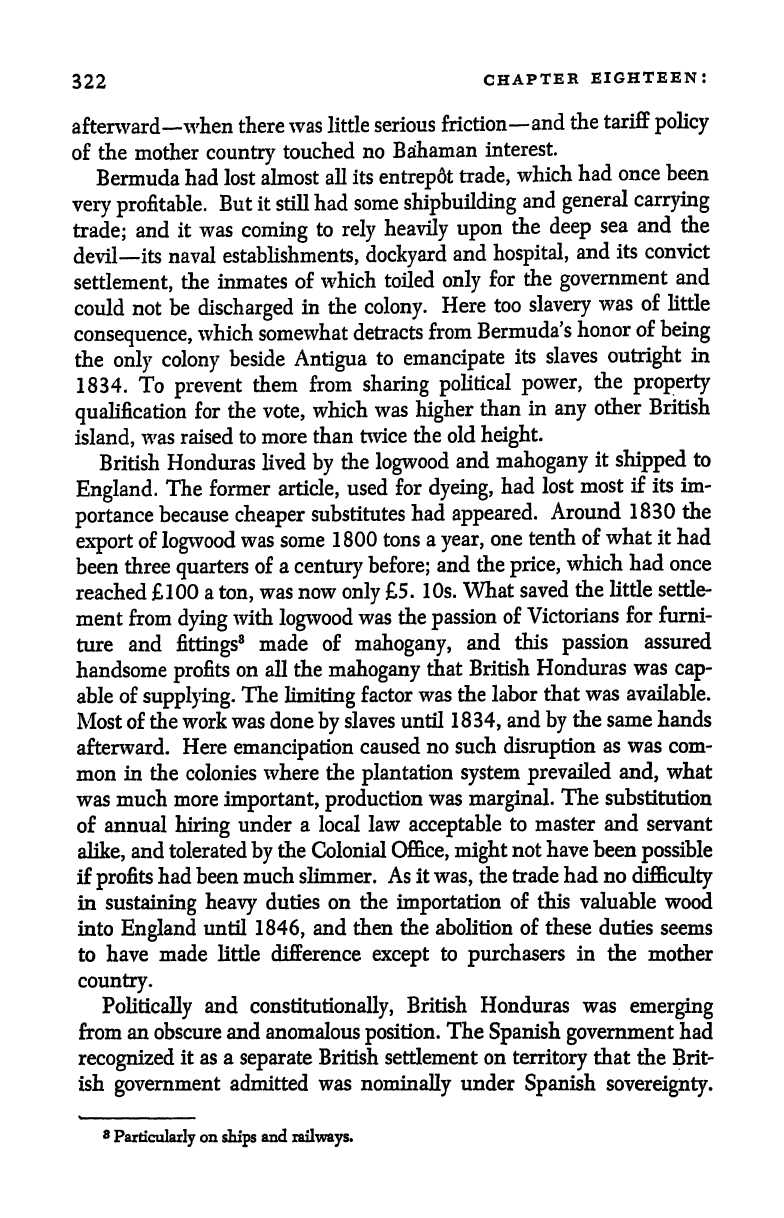
322
CHAPTER
EIGHTEEN:
afterward
when
there
was little
serious
friction
and
the
tariff
policy
of
the
mother
country
touched
no
Bahaman
interest.
Bermuda
had
lost almost
all
its
entrep6t
trade,
which
had
once been
very profitable.
But
it
still
had
some
shipbuilding
and
general
carrying
trade;
and
it
was
coming
to
rely
heavily
upon
the
deep
sea
and the
devil its
naval
establishments,
dockyard
and
hospital,
and
its
convict
settlement,
the
inmates
of
which
toiled
only
for
the
government
and
could
not be
discharged
in
the
colony.
Here
too
slavery
was of
little
consequence,
which somewhat
detracts
from
Bermuda's
honor
of
being
the
only
colony
beside
Antigua
to
emancipate
its
slaves
outright
in
1834.
To
prevent
them from
sharing
political
power,
the
property
qualification
for
the
vote,
which
was
higher
than
in
any
other
British
island,
was
raised to
more
than
twice
the old
height.
British
Honduras lived
by
the
logwood
and
mahogany
it
shipped
to
England.
The
former
article,
used
for
dyeing,
had
lost
most if
its im-
portance
because
cheaper
substitutes
had
appeared.
Around
1830
the
export
of
logwood
was some
1800
tons
a
year,
one
tenth
of
what it
had
been
three
quarters
of
a
century
before;
and the
price,
which
had
once
reached
100
a
ton,
was
now
only
5.
10s. What
saved
the little settle-
ment
from
dying
with
logwood
was
the
passion
of
Victorians
for furni-
ture
and
fittings
3
made
of
mahogany,
and
this
passion
assured
handsome
profits
on all
the
mahogany
that
British
Honduras
was
cap-
able
of
supplying.
The
limiting
factor
was
the
labor
that
was available.
Most of
the
work
was done
by
slaves until
1834,
and
by
the same hands
afterward.
Here
emancipation
caused
no
such
disruption
as was
com-
mon
in
the
colonies
where the
plantation
system
prevailed
and,
what
was much more
important,
production
was
marginal.
The
substitution
of
annual
hiring
under
a
local
law
acceptable
to
master and
servant
alike,
and
tolerated
by
the
Colonial
Office,
might
not have been
possible
if
profits
had been
much slimmer. As
it
was,
the
trade
had no
difficulty
in
sustaining
heavy
duties
on the
importation
of this
valuable
wood
into
England
until
1846,
and then the
abolition of these duties
seems
to
have
made little difference
except
to
purchasers
in
the mother
country.
Politically
and
constitutionally,
British
Honduras
was
emerging
from
an obscure and anomalous
position.
The
Spanish
government
had
recognized
it
as
a
separate
British settlement on
territory
that
the Brit-
ish
government
admitted
was
nominally
under
Spanish
sovereignty.
8
Particularly
on
ships
and
railways.
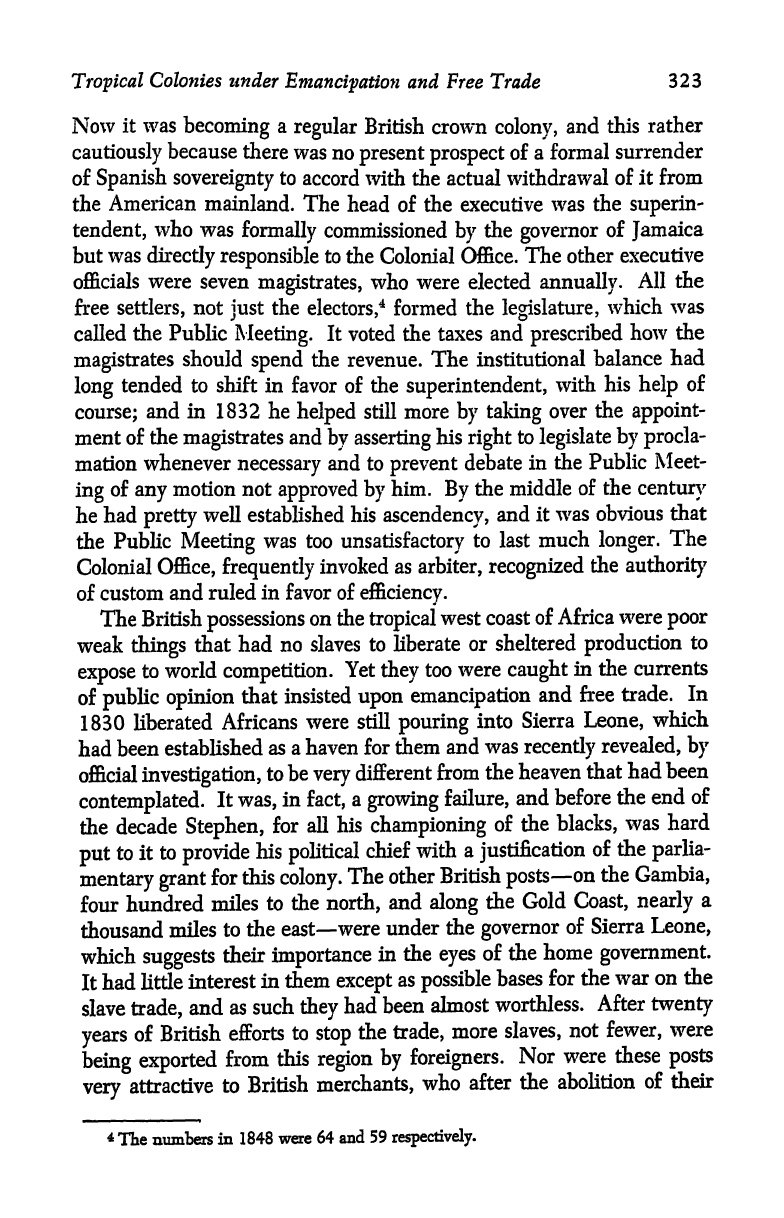
Tropical
Colonies
under
Emancipation
and Free Trade
323
Now
it was
becoming
a
regular
British crown
colony,
and
this
rather
cautiously
because
there
was
no
present prospect
of
a
formal
surrender
of
Spanish
sovereignty
to
accord
with the actual
withdrawal
of
it from
the
American
mainland.
The
head of
the
executive
was
the
superin-
tendent,
who
was
formally
commissioned
by
the
governor
of
Jamaica
but
was
directly
responsible
to the
Colonial
Office.
The other
executive
officials
were seven
magistrates,
who
were elected
annually.
All
the
free
settlers,
not
just
the
electors,
4
formed
the
legislature,
which
was
called
the Public
Meeting.
It
voted the
taxes and
prescribed
how
the
magistrates
should
spend
the revenue. The
institutional
balance
had
long
tended to
shift in
favor
of the
superintendent,
with
his
help
of
course;
and in 1832 he
helped
still
more
by
taking
over
the
appoint-
ment
of
the
magistrates
and
by
asserting
his
right
to
legislate
by
procla-
mation
whenever
necessary
and to
prevent
debate
in
the
Public
Meet-
ing
of
any
motion not
approved by
him.
By
the
middle
of
the
century
he
had
pretty
well
established his
ascendency,
and
it
was
obvious
that
the
Public
Meeting
was
too
unsatisfactory
to last
much
longer.
The
Colonial
Office,
frequently
invoked
as
arbiter,
recognized
the
authority
of
custom
and
ruled
in
favor of
efficiency.
The
British
possessions
on the
tropical
west
coast
of
Africa
were
poor
weak
things
that
had
no slaves
to liberate
or sheltered
production
to
expose
to world
competition.
Yet
they
too
were
caught
in the
currents
of
public
opinion
that
insisted
upon
emancipation
and
free
trade.
In
1830
liberated
Africans
were still
pouring
into
Sierra
Leone,
which
had
been
established
as a
haven for
them
and
was
recently
revealed,
by
official
investigation,
to be
very
different
from
the
heaven
that
had
been
contemplated.
It
was,
in
fact,
a
growing
failure,
and
before
the
end
of
the
decade
Stephen,
for
all
his
championing
of
the
blacks,
was
hard
put
to
it
to
provide
his
political
chief
with
a
justification
of
the
parlia-
mentary grant
for
this
colony.
The
other
British
posts
on the
Gambia,
four
hundred
miles
to
the
north,
and
along
the
Gold
Coast,
nearly
a
thousand
miles
to
the east
were
under
the
governor
of Sierra
Leone,
which
suggests
their
importance
in
the
eyes
of
the
home
government.
It
had little
interest
in
them
except
as
possible
bases
for
the
war
on
the
slave
trade,
and
as
such
they
had
been
almost
worthless.
After
twenty
years
of
British
efforts
to
stop
the
trade,
more
slaves,
not
fewer,
were
being
exported
from
this
region
by
foreigners.
Nor
were these
posts
very
attractive
to
British
merchants,
who
after
the
abolition
of
their
4
The
numbers
in
1848
were
64
and
59
respectively.
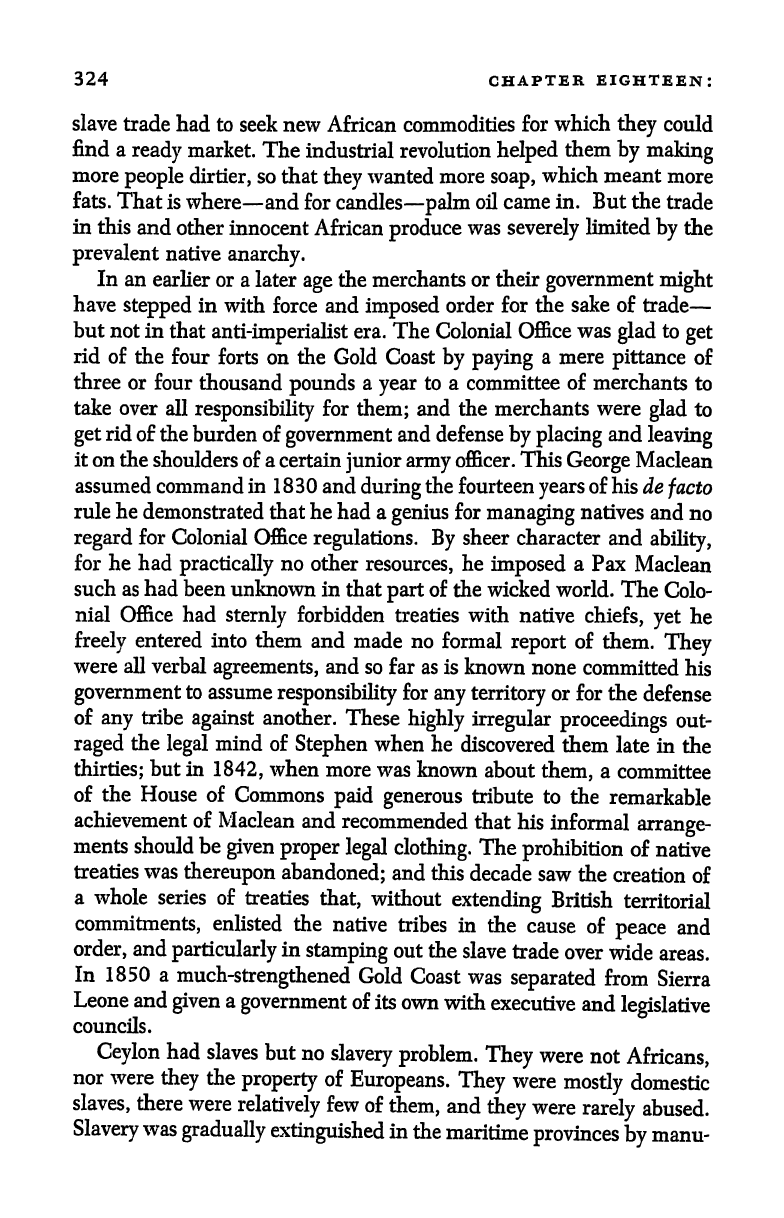
324
CHAPTER
EIGHTEEN:
slave
trade
had
to
seek new
African commodities
for
which
they
could
find a
ready
market. The
industrial
revolution
helped
them
hy
making
more
people
dirtier,
so
that
they
wanted
more
soap,
which meant
more
fats.
That is
where
and
for candles
palm
oil
came
in. But
the
trade
in this
and
other
innocent African
produce
was
severely
limited
by
the
prevalent
native
anarchy.
In
an
earlier
or a later
age
the merchants
or their
government
might
have
stepped
in
with
force
and
imposed
order
for the
sake
of
trade
but
not
in
that
anti-imperialist
era. The Colonial Office
was
glad
to
get
rid of
the
four
forts
on
the Gold Coast
by
paying
a
mere
pittance
of
three
or
four
thousand
pounds
a
year
to
a
committee
of
merchants
to
take over
all
responsibility
for
them;
and
the merchants were
glad
to
get
rid
of
the burden
of
government
and defense
by
placing
and
leaving
it
on
the
shoulders
of a
certain
junior army
officer. This
George
Maclean
assumed
command
in
1830
and
during
the
fourteen
years
of
his de
facto
rule
he
demonstrated
that
he
had a
genius
for
managing
natives
and
no
regard
for
Colonial Office
regulations. By
sheer character
and
ability,
for he
had
practically
no other
resources,
he
imposed
a
Pax
Maclean
such as had
been
unknown
in
that
part
of
the
wicked
world.
The
Colo-
nial
Office
had
sternly
forbidden
treaties
with
native
chiefs,
yet
he
freely
entered into them
and
made no
formal
report
of
them.
They
were all
verbal
agreements,
and
so far as
is
known none
committed
his
government
to
assume
responsibility
for
any
territory
or for
the
defense
of
any
tribe
against
another.
These
highly
irregular
proceedings
out-
raged
the
legal
mind
of
Stephen
when he
discovered
them
late in
the
thirties;
but in
1842,
when
more
was
known
about
them,
a
committee
of
the House
of
Commons
paid
generous
tribute
to
the
remarkable
achievement of Maclean
and
recommended that
his
informal
arrange-
ments should
be
given
proper
legal
clothing.
The
prohibition
of
native
treaties was
thereupon
abandoned;
and this
decade
saw
the
creation
of
a
whole series
of
treaties
that,
without
extending
British
territorial
commitments,
enlisted
the
native
tribes in the
cause
of
peace
and
order,
and
particularly
in
stamping
out
the
slave
trade
over
wide
areas.
In 1850 a
much-strengthened
Gold
Coast
was
separated
from
Sierra
Leone
and
given
a
government
of
its own
with
executive
and
legislative
councils.
Ceylon
had
slaves
but no
slavery problem.
They
were
not
Africans,
nor
were
they
the
property
of
Europeans.
They
were
mostly
domestic
slaves,
there
were
relatively
few
of
them,
and
they
were
rarely
abused.
Slavery
was
gradually
extinguished
in
the
maritime
provinces
by
manu-
